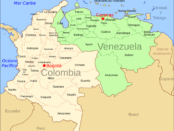A letter: On the Colombia-Venezuela border conflict
There have been reports in the U.S. corporate media about the conflict on the border area between Colombia and Venezuela that distort the events there and omit the history of this conflict as well as the disruptive and subversive role of U.S. imperialism in the region. The following is a letter to Workers World from someone who lived in Colombia for many years that clarifies much of this.
 Aug. 26 – The Colombian-Venezuelan border is a special place with its own characteristics: the meeting of two countries, one with a leftwing Bolivarian government and the other with a neoliberal right-wing government. Colombia has had years of war, massacres, over 5 million displaced people, political repression, military and paramilitary attacks on the communities and of course, immense poverty … probably over 60 percent of the population [are poor].
Aug. 26 – The Colombian-Venezuelan border is a special place with its own characteristics: the meeting of two countries, one with a leftwing Bolivarian government and the other with a neoliberal right-wing government. Colombia has had years of war, massacres, over 5 million displaced people, political repression, military and paramilitary attacks on the communities and of course, immense poverty … probably over 60 percent of the population [are poor].
On the other hand, Venezuela with Chávez proclaimed a socialist Bolivarian revolution and has been trying to replace what had been a disaster for the people for many years by building universities, schools, subsidized markets, control of the natural resources and rejecting U.S. military and political intervention.
Unfortunately, Colombia has welcomed all that the U.S. offers: seven military bases, one becoming the new School of the Americas, others preparing for the invasion of other Latin American and Caribbean countries, and still others devoted to massive information collection. The elites’ pockets get fatter and fatter. The free trade agreements signed in 2012 reinforced U.S. companies’ dominance in mining, oil, coal, flowers, bananas, etc.
What does all this have to do with the border? Throughout the times of Chávez in Venezuela, Colombia had created a fleeing population with its war on the people and many fled right into Venezuela. Thousands of Colombians crossed the border illegally, setting up makeshift houses on the other side from the Guajira to Arauca. Most people were honest folks running for their lives. They were welcomed in Venezuela, legalized, given land, health care, schools, etc.
As this was happening, Álvaro Uribe Vélez, the Colombian president for eight years (2002-2010), blasted continuous threats of invasion of Venezuela. The strong Colombian press and the international press supported him. Of course, the U.S. was using Colombia as a pawn to move on and try to destroy the Bolivarian Revolution of Venezuela. But Venezuela stood firm and faced the international war against them … and they remained anti-imperialist, which was their sin in the capitalist world.
Colombia ran drugs through Venezuela but the Venezuelans resisted — [Colombia] positioned paramilitary forces (actually the same as military) and [Venezuela] still resisted. But the time had come to clean the border up. That does not mean deporting all the Colombians on the border as the international press is saying.
The Colombians living in Venezuela want [the Venezuelan government] to get rid of the mess from Colombia. People on the Venezuelan side have no food because of the contraband. The shops won’t sell goods and food to the people in Venezuela because they can sell it to [Colombian smugglers] who take it across the border and sell it for a lot more.
[Colombian smugglers] crossed the border and bought the gasoline to take back to Colombia — there was none left for the people in Venezuela. [Colombian] paramilitaries intimidated the communities charging people taxes just to breathe, taking their businesses and houses, taking their daughters, prostituting those who could not escape and running drugs and contraband and at the same time plotting for the overthrow of the Bolivarian Revolution.
When Venezuelan soldiers were shot by Colombian paramilitaries in early August, Maduro said, “No more!” Venezuela doesn’t need the Colombian problems of violence and war across their borders.
I am just surprised it didn’t happen sooner. Today on the news I saw people smiling and their hands full of groceries because they could go and now buy food at government controlled prices. Who knows if they were Venezuelans or Colombians?
The people of Latin America are awakening and resisting. Just because Colombia has a U.S. backed, right-wing government doesn’t mean that the people are happy. There are many Colombians who are Bolivarians, many peasant, student and popular movements. There has to be because there are around 9,000 political prisoners in the jails of Colombia. The repression and killings continue to target these movements.
The Colombian people are lucky to have Ecuador and its Citizens Revolution and Venezuela and its Bolivarian Revolution on each side. They will always be a support to the Colombian people.

